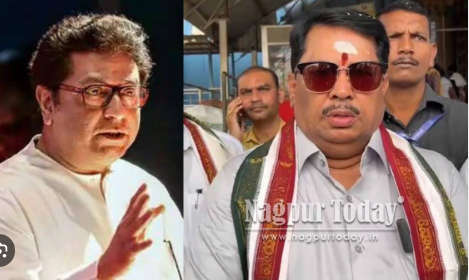Nagpur/Mumbai: A storm of political outrage has erupted across Maharashtra over the State Government’s revised education framework for 2024, which introduces Hindi as the ‘general’ third language from Classes 1 to 5. The move, perceived as a backdoor imposition of Hindi, has triggered sharp reactions from opposition parties, especially the Maharashtra Navnirman Sena (MNS) and the Congress.
The latest Government Resolution (GR) replaces the earlier term “mandatory” with “general” while referring to Hindi as the third language in Marathi and English-medium schools. However, the Opposition has slammed this change as “cosmetic wordplay” meant to deceive the public while continuing with the same intent — to enforce Hindi at the grassroots level.
What does the new GR say?
As per the revised policy, Hindi will generally be taught as the third language in Classes 1 to 5. Students may opt for another Indian language instead of Hindi, but only if a minimum of 20 students in a school formally express this preference. Only then will a teacher be appointed for that language; otherwise, it will be offered through online mode.
Opposition leaders argue that such a clause makes opting for other languages practically unfeasible, especially in smaller schools. The so-called “choice,” they claim, is a bureaucratic hurdle designed to ensure Hindi remains the de facto option.
MNS fires warning: “This is cultural aggression”
Strongly opposing the move, MNS chief Raj Thackeray said, “This is nothing but an attempt to impose Hindi under the guise of semantics. The term ‘general’ is being used to mislead the public — the agenda remains the same. Hindi is being forced upon Marathi children, and this cultural imposition must be resisted.”
Thackeray also alleged that the IAS lobby is behind the Hindi push, aiming to ease communication for officers unwilling to learn Marathi. “This is why they want to avoid speaking Marathi — I have names of the officers lobbying for this. This is a conspiracy against our language and identity.”
Congress slams Fadnavis: “A knife to the chest of Marathi”
Congress leader Vijay Wadettiwar also launched a scathing attack on the government, accusing Chief Minister Devendra Fadnavis and the BJP of betraying Marathi interests.
“They claim Hindi is not mandatory anymore, but the GR makes it clear — Hindi is a must unless 20 students demand an alternative. It’s not a choice; it’s coercion.” Wadettiwar accused the BJP of furthering its “One Nation, One Language, One Culture” agenda.
“This is a direct assault on Marathi identity, language, and pride. The Shinde-led Shiv Sena faction has completely abandoned the pro-Marathi stance of Balasaheb Thackeray, and Ajit Pawar is silent because he is more interested in power and finance.”
Both MNS and Congress have questioned whether this language policy is a reflection of Delhi’s national agenda or a betrayal of Maharashtra’s cultural sovereignty. They say the policy not only undermines linguistic diversity but also marginalizes non-Hindi speakers by placing procedural and logistical hurdles in opting for other Indian languages.
Mounting resistance: Cultural invasion or policy reform?
Although the GR mentions that Marathi remains a compulsory subject, the insistence on Hindi and conditional access to other languages indicates a deliberate tilt, critics say. This, they argue, is part of a broader centralization effort to dominate regional education systems.
The controversy is fast transforming into a full-fledged agitation. Cultural organizations, educationists, and political parties are rallying behind the cause to “protect Marathi” from what they term as a systemic cultural attack. MNS and Congress have both vowed to intensify protests in the days to come.















